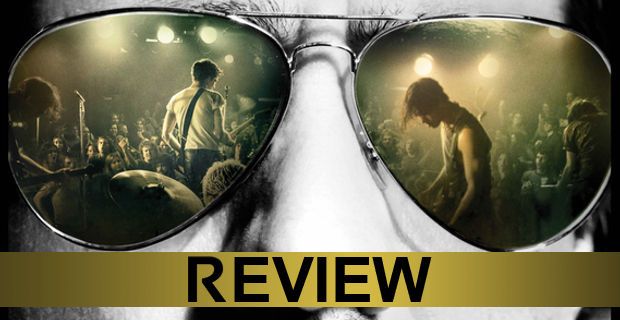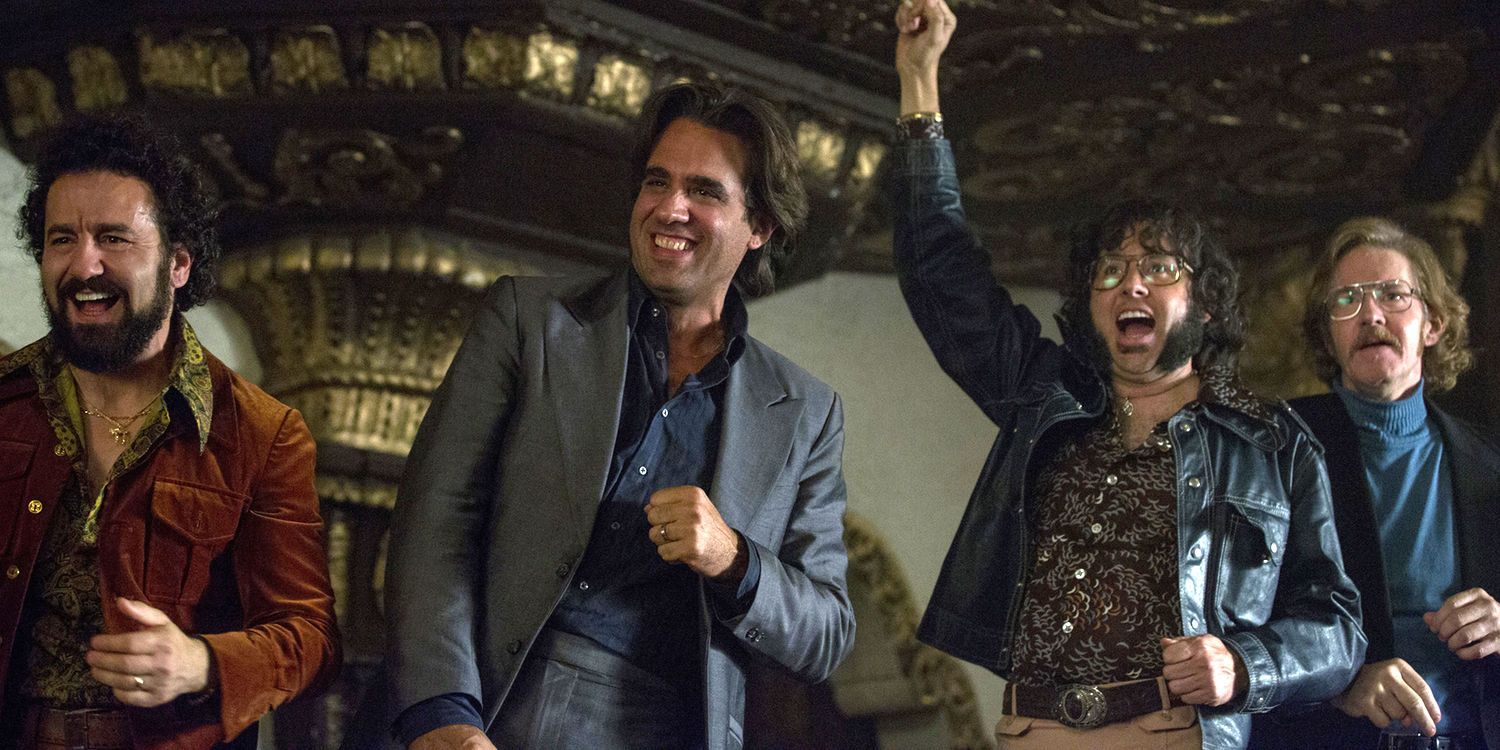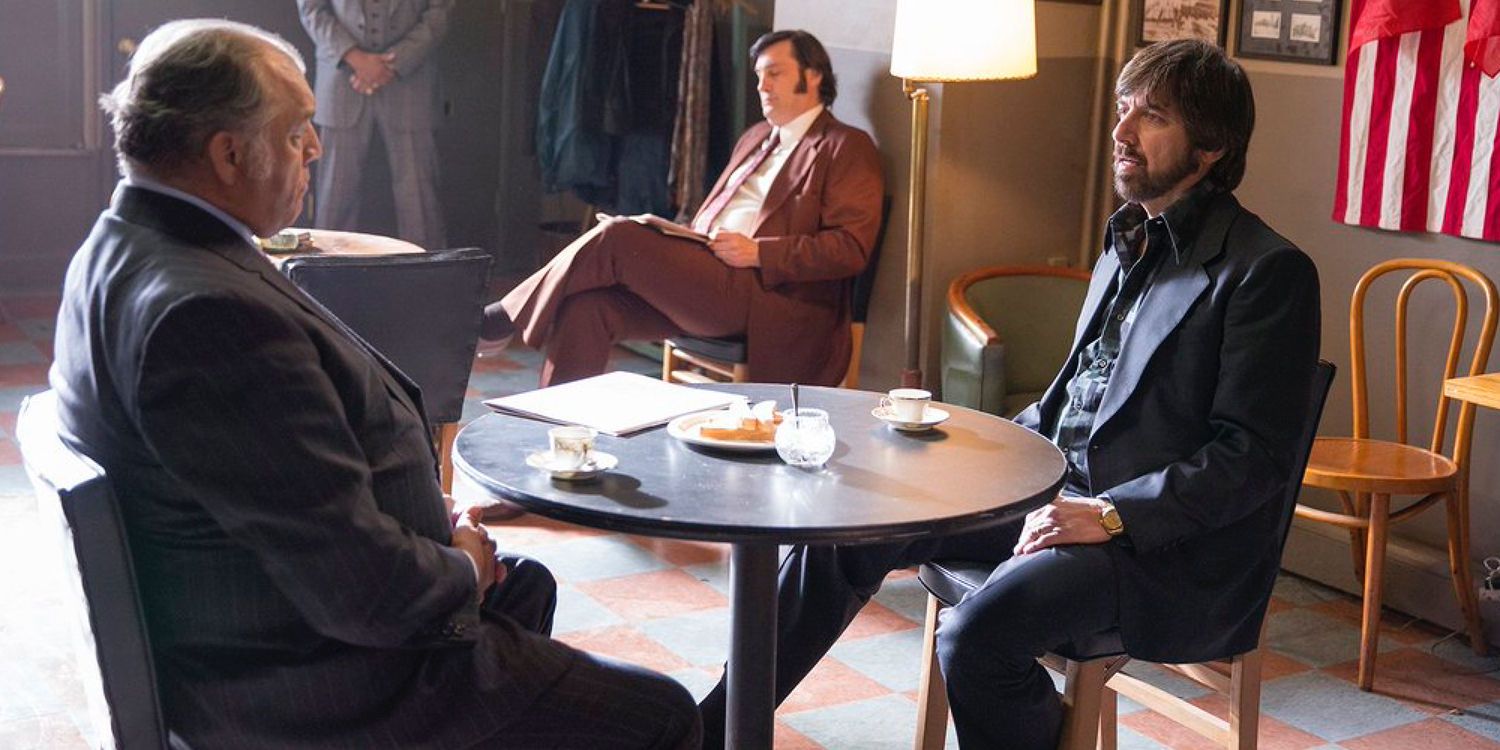[This is a review of Vinyl season 1, episode 10. There will be SPOILERS.]
-
The closing moments of HBO's Vinyl don't simply end with a glimmer of hope for series protagonist Richie Finestra (Bobby Cannavale) and his ailing record label; they inadvertently parallel the behind-the-scenes moves made by the network, which saw co-creator Terence Winter ousted as showrunner following a surprisingly unsatisfying first season. In the final scene, the upheaval only touches the surface, after a clear-eyed Richie encourages his employees to vandalize the stuffy environs of their slow-to-adapt record label as a way of demonstrating a newfound commitment to the rapidly changing expectations and musical tastes in 1973.
Beyond the (at the time) unintended irony of Max Casella's Julie Silver kicking off the chaotic revelry and celebration of rebirth by spray painting "F*** this place" on the walls of his office, there's a sense that, like its main character, Vinyl has achieved some level of self-awareness and clarity about where it is headed. The fact that it does this in the midst of a bacchanal with its chaotic lead sober as a judge, and not, as had been done so many times before, by pushing the camera deep into the cavernous recesses of his sinus cavity in pursuit of the cocaine he'd just inhaled, hints at a kind of maturation of the series itself. But while the successful launch of American Century's sub-label, Alibi Records is just what the doctor ordered for Richie Finestra – a.k.a. The Last of the Difficult Men – it was apparently too little, too late for HBO.
The initially underwhelming praise for the series premiere, despite it coming from the Dream Team of Martin Scorsese, Mick Jagger, and Winter, along with the uninspiring ratings the two-hour pilot achieved were early indicators that the next big thing on TV hadn't necessarily arrived. Nonetheless, despite the discouraging reactions, Vinyl was given an early second season renewal – a move that could be seen more as a strategy on behalf of the network to encourage skeptical viewers to devote their already fractured TV time on a shaky series by promising their investment would see a return of at least another 10 episodes. In the end, though, once the season had wrapped and work was presumably soon to begin on season 2, Winter found himself out, while screenwriter Scott Z. Burns (Contagion, Side Effects) was brought in to set a new course for the series.
Winter is responsible for one of the most memorable Sopranos episodes ever in 'Long Term Parking.' He also nabbed an Oscar nomination for his work scripting The Wolf of Wall Street, and he created one of HBO's more recent stabs at greatness with Boardwalk Empire. But like Boardwalk, Vinyl suffered from pinning a great deal of its narrative on the least interesting character in its roster. Cannavale often delivered a tremendous performance, making a meal of even the smallest lines of dialogue and often imbuing Richie's antics with tragicomic sensibilities, so that, even though he was a deliberately difficult and reprehensible character drawn in the style of Don Draper and Tony Soprano (though more the former than the latter), there was an underlying sense of clowning that helped make his incessant self-destructive and belligerent behavior more palatable. But having a sense of humor about the miserableness of your protagonist only goes so far, and after a while, Richie's volcanic personality failed to be tempered by the same sort of complexity and pathos held by his Golden Age of Television forefathers. And so, in the end, any indulgence paid to Richie and his erratic whims felt increasingly unearned.
The feeling that one could throw a Donnie Osmond record and hit a more interesting supporting character only exacerbated the show's core problem. Vinyl's roster was filled with the likes of Juno Temple's Jamie, Olivia Wilde's Devon, and even Ray Romano's Zak – all of whom turned in terrific performances throughout the season – which meant every minute they were not onscreen felt like a missed opportunity. But it wasn't merely an opportunity to showcase characters with a more unique point of view that went overlooked; it was that Richie's story also serviced a narrative structure that has grown too familiar over the last decade and a half.
With Richie at the center, Devon was shuffled off into unfulfilled suburban wife territory, while Jamie was fitted for the role of ambitious young woman struggling to have her voice heard in a male-dominated workplace. Each character had their moments; Devon, in particular, enjoyed a late-season episode wherein she tried to recapture the artistic energy that had been lost raising two kids in Greenwich, while Jamie peaked early, discovering the Nasty Bits and making the transition from secretary/pharmacopeia manager to a key player on the A&R team. Zak, meanwhile, was given the enviable task of throwing Richie a well-earned beating and then sharing a ambiguous glance with his onetime friend who, in spite of shepherding the company's apparent renaissance into punk and disco, also walked it right into the hands of a violent mobster.
And therein lies another questionable choice in a series of already debatable decisions the series made in its first season. Was the involvement of gangster Corrado Galasso (Armen Garo) and the murder of Buck Roger (Andrew Dice Clay) at all interesting beyond the minor obstacles either presented throughout the course of the season? Were those threads integral to the story at hand – i.e., a story that seemingly wanted to be about music and the emotional effervescence it instills in those listening – or were they just distractions and expectations of a narrative that credits Martin Scorsese as executive producer? The answer may be in how Richie found a way to accommodate both the FBI and the gangster to whom he's indebted, suggesting the thread's easy placement on the backburner once season 2 rolls around.
The question now is: Where can the series go from where it left off with 'Alibi'? There's a wealth of opportunity for reinvention that is completely in line with how the final sequence unfolded. Richie got the ending he wanted but there's still a sense of uncertainly for what the future holds. The same is true of Burns stepping in to see his vision executed, which only requires a modicum of optimism to think it might yield something exciting. Still, it's going to take a lot of effort, but the hope is that season 2 will bring to the series a more thorough makeover than Richie instigated by handing out cans of spray paint and a few anarchic words of encouragement.
-
Vinyl season 2 is expected sometime in 2017 on HBO.



